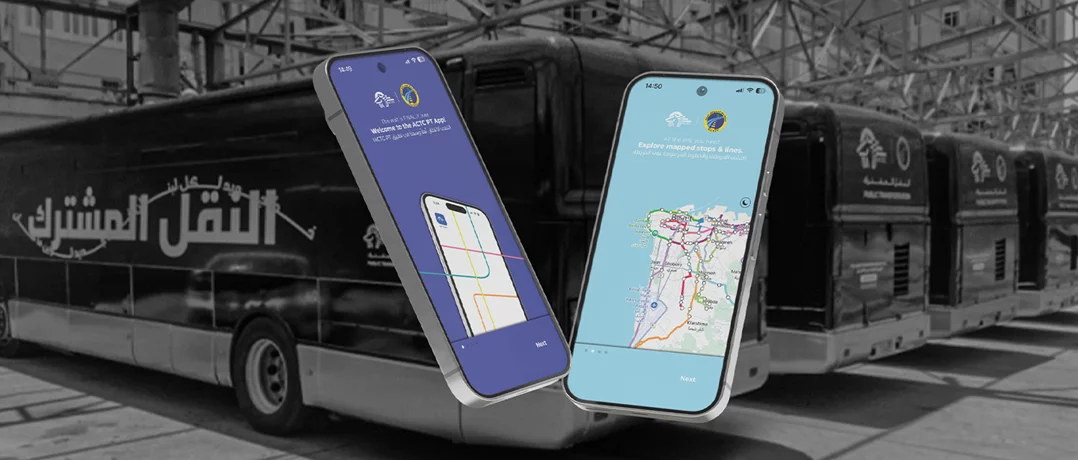For the first time, Lebanon’s public buses have gone digital with a new app that lets commuters track routes, plan trips, and navigate the city in real time.
Lebanon’s buses finally go digital

Open the new ACTC bus app, and the first thing you see is blue. Beirut and its surrounding area show up on the screen along with stop dots and lines all over the map “Yalla!” the app says before planning your trip, monitoring your ride, and uncovering the quickest route.
For the first time, Lebanon’s public buses can be tracked in real time. The Ahdab Commuting and Trading Company (ACTC), in collaboration with the Railways and Public Transportation Authority (RPTA), has launched a system connecting the country’s fleet through one unified app.
“As a public institution, our goal was to ensure that any partnership with the private sector truly benefits the citizen,” says Ziad Chayya, Director of the RPTA. “We set clear specifications through the Public Purchasing Authority, and ACTC was selected based on meeting and exceeding these standards. The app is the result of continuous cooperation between us and the operator to make public transport easier and more comfortable for everyone.”
“What inspired us to create this app is the desire to offer real technological progress to our users,” adds Aouni Ahdab, ACTC’s Managing Director. “It’s been more than 30 years without a proper public transportation system. We wanted to deliver something that finally meets international standards.”
A leap toward modern transport
ACTC’s buses are now fully equipped with GPS tracking, onboard cameras, and AI monitoring technology that far exceeds the original tender. “We went out of scope because we wanted to do something that felt like real change, not just operate old and unsafe buses,” Ahdab says.
The results were immediate. Since the app’s launch, ACTC’s call center once flooded with over 500 daily calls now receives fewer than 200. “People used to call just to ask where the buses were,” Ahdab explains. “After the app launched, we felt the difference.”
Today, 93 buses operate on 11 routes connecting Beirut, Tripoli, Tyre, and the Bekaa, with buses passing every 20–25 minutes. “Now you can plan your timing instead of waiting under the sun or in the rain,” Ahdab says.
How it works
No login is required. “Just open it and the first thing you see is a map of Lebanon with all our routes,” Ahdab explains. Tap any line to view active buses in real time. The second tab, Where To, lets users enter starting and destination points to calculate the most efficient path.
Building safety and trust
For Ahdab, the motivation is personal. “The main focus behind this business model was my younger sister,” he says. “I wanted something that made it safe for her and other young women to use the bus.”
To rebuild trust, ACTC invested in a brand new set of cameras, 24/7 operations room and a quick response call center, as well as also putting in place cleanliness and uniformity measures. “We revamped the buses, unified the colors, and gave them a modern feel,” Ahdab adds. “If you have a clean, reliable, and safe mode of transportation, people will start using it again.”
Ridership has seen a whopping increase from 200 passengers on the first day to around 7,000 passengers daily as per the latest report. “The growth is fascinating, and we’re very happy with the results,” he says.
Challenges and collaboration
Behind the polished app was a struggle for legitimacy. “The biggest challenge wasn’t the operation,” Ahdab admits. “It was breaking the stigma facing the mafia on the ground that was terrorizing any company trying to introduce something professional.”
Government backing was key. “This project was in collaboration with the RPTA and supported by the Ministry of Public Transportation and security services,” he says. “They backed us whenever we faced issues. Now, we can confidently say we’ve established ourselves as the only official transportation provider.”
Chayya sees the project as part of a national reform. “This application is part of a process to modernize public transport in Lebanon,” he says. “It’s one in a series of measures being implemented as we move toward a more structured and transparent system.”
Connectivity challenges persist, but ACTC found creative solutions. “We alternate between ALFA and MTC SIM cards to maintain GPS accuracy,” Ahdab explains. “You might see some lag, but when there’s a major issue, it affects all mobile users, not just us.”
A legacy on the move
For Ahdab, this project is deeply personal. “It’s been a childhood dream,” he says. “My grandfather started the Tripoli–Beirut route in the 1950s. This project carries sentimental value it’s a legacy we’re continuing.”
The app furthermore shows the regulated rates: 100,000 LBP for the capital, 150,000 LBP from Tripoli to the capital, and 200,000 LBP from the capital to Tyre. It’s a little revolution in trustworthiness the application is already used by more than 50,000 people.
As ACTC awaits new buses donated by Qatar and China, the mission goes beyond infrastructure. The essence of it all is connection connecting cities, connecting human beings, and connecting an outdated system to a new one with its new-fashioned order.
For the time being, the blue light coming from the app resembles a tiny beacon at the end of Lebanon's extensive and turbulent trip of daily commuting just a single push that conveys, finally yalla, let's hit the road.



.webp)